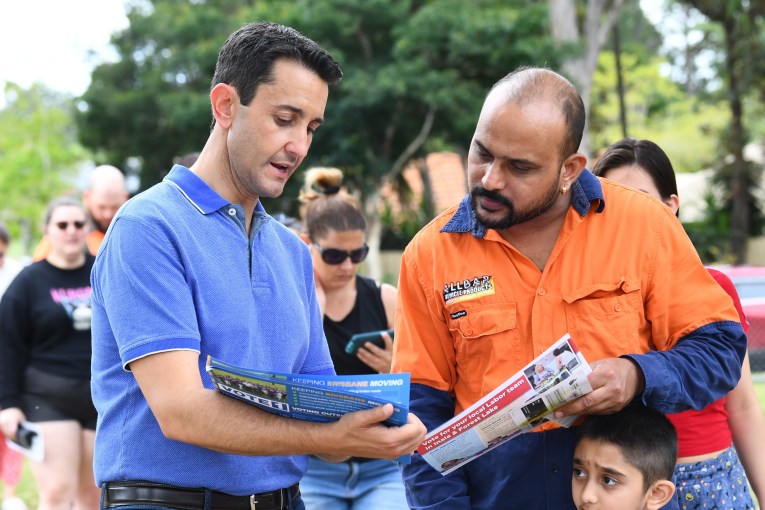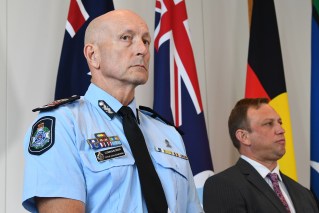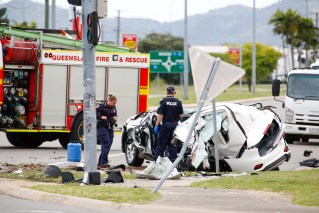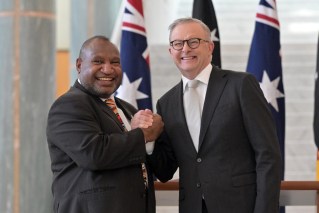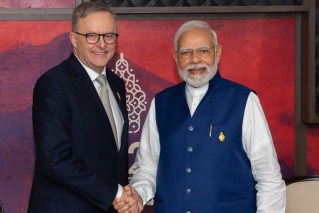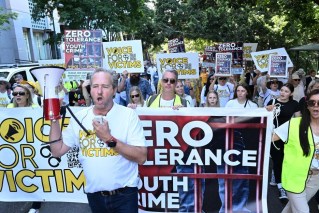‘Good riddance’ as border barricades to be retired after two long years
After losing billions of dollars when Covid restrictions destroyed its business model, Flight Centre has said what everyone else felt about the border restrictions: goodbye, it’s been a pain.
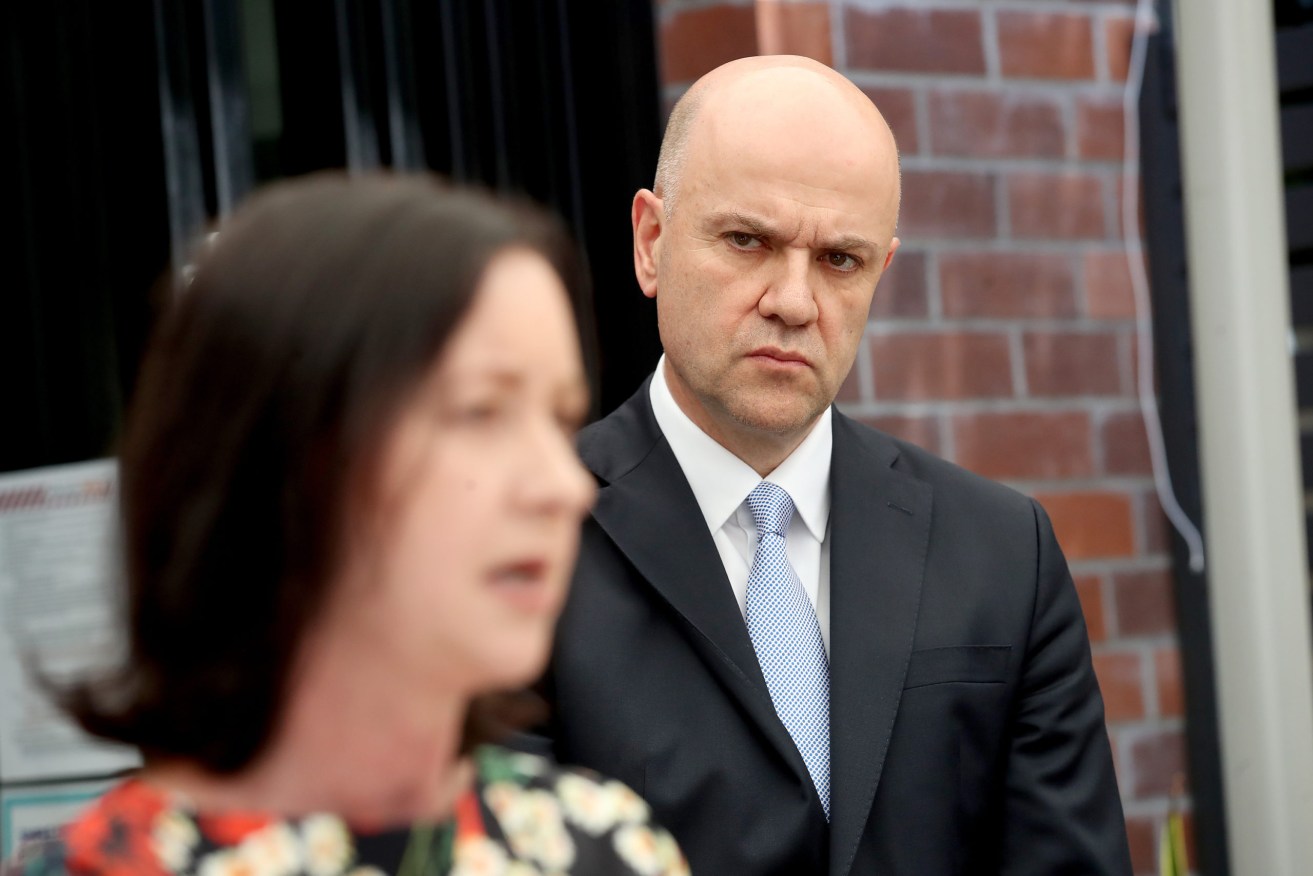
Queensland Chief Health Officer Dr John Gerrard looks on during a press conference by Health Minister Yvette D'Ath in Brisbane. (AAP Image/Jono Searle)
At 1am on Saturday, two years after they first went up, the police barricades of Queensland’s borders will come down.
Domestic travellers will no longer need to show border passes or the results of COVID-19 tests when coming into the State by road or air.
However, the impact on tourism from the Omicron variant is far from over with Qantas and Jetstar slashing capacity.
The airlines have not revealed which services would be affected but said capacity in the current quarter would be about 70 per cent if pre-Covid levels, down from the expected 102 per cent.
International capacity would fall from 30 per cent to 20 per cent of pre-Covid levels.
The changes were focused on reduced frequency and the size of aircrafts used and follows increased travel restrictions in some overseas markets.
Flight Centre Corporate managing director James Kavanagh welcomed Premier Annastacia Palaszczuk’s border announcement.
He said the need for pre-arrival testing had been a real pain point for travellers wanting to come to Queensland and the lifting of restrictions will be a significant win for businesses big and small.
“We’ve long championed that vaccinations are the pathway to freedom and today’s announcement is another major step in living with COVID-19 as Australia moves into a new phase,” Kavanagh said.
The decision, ahead of the State hitting the 90 per cent double vaccinated milestone at the end of next week, was announced by Premier Annastacia Palaszczuk, on Thursday morning.
Made after consultation with the State’s chief health officer and the Police Commissioner, the new domestic travel freedoms reflect the surge in Omicron cases throughout the State along with record numbers in southern states.
But no changes will be made to the border arrangements for international travellers just yet. That decision will wait until a 90 per cent declaration is made.
It means that domestic travellers into Queensland, from 1am Saturday, by road or air, will not have to show a border pass.
They will also not have to show a negative rapid antigen test.
Police manning those border checkpoints will, from the that time, head home to their operational duties after what Police Commissioner Katarina Carroll described as a marathon effort and one for which she was exceptionally proud of her troops.
Palaszczuk said the decision was based on advice from the chief health officer who had advised on Thursday morning that the Omicron spread down the east coast meant the physical border closures were no longer necessary.
“Now is the time for the barricades to come down and for the police to come home,” Palaszczuk said.
“That means anyone coming domestically across into Queensland, either by road or by air, they do not have to show that they have had their border pass, they don’t have to show that they have had a rapid antigen test … the time is now right as we head towards hitting that 90 per cent next week,” she said.
Measures in regard to international travel will remain in place until the State hits the 90 per cent mark and it is officially declared, she said.
“it is a big decision but it is a decision that is needed as we reach the peak of this Omicron wave. Operationally the police are needed at the frontline and they have done an absolutely superb job … it is the right decision.”
Palaszczuk said it would mean those on the border regions, northern NSW and the Gold Coast, could now freely reunite after bearing the brunt of the closures.
Health Minister Yvette D’Ath said the border decision reflected the changing nature of virus cases across the country.
“it was important throughout 2021 that we controlled those people coming from hotspots and have restrictions around that. That is becoming less important by the day because this virus could be in any jurisdiction with anyone travelling, whether they are coming from a hotspot or not.
“We don’t want to spend our time declaring and changing hotspots.”
D’Ath said now the assumption was than anyone travelling around Australia domestically could have the virus.
She said what was more important was to know where they were going and to ensure that only fully vaccinated people entered certain venues such as restaurants.
Arrangements for international travellers will remain until the State hits 90 per cent double vaccinated, she said.
D’Ath said arrangements for airline and maritime crews, particularly in relation to the unvaccinated, were still being formulated.
Police Commissioner Katarina Carroll welcomed the coming down of barricades, which had first gone up in March 2020.
Police would now get back to business as usual and prepare for the virus peak in the next few weeks.
In illustrating the magnitude of the two-year operation, Carroll released statistics:
– 3.3 million online border passes had been declared;
– 3.68 million vehicles had been subject to checks at road borders;
– 35,902 vehicles had been turned around;
– 20,247 persons had been directed into quarantine at borders;
– 29,336 flights had been met by police at airports;
– 1.8 million passengers had been checked;
– 4452 persons had been refused entry at domestic airports;
– 4112 international flights had been met and 117,182 passengers processed;
– 64,466 people on domestic flights had been directed into quarantine.
